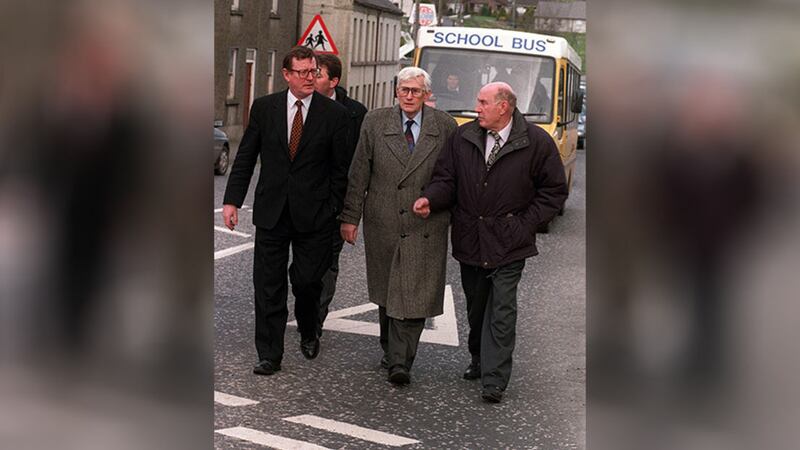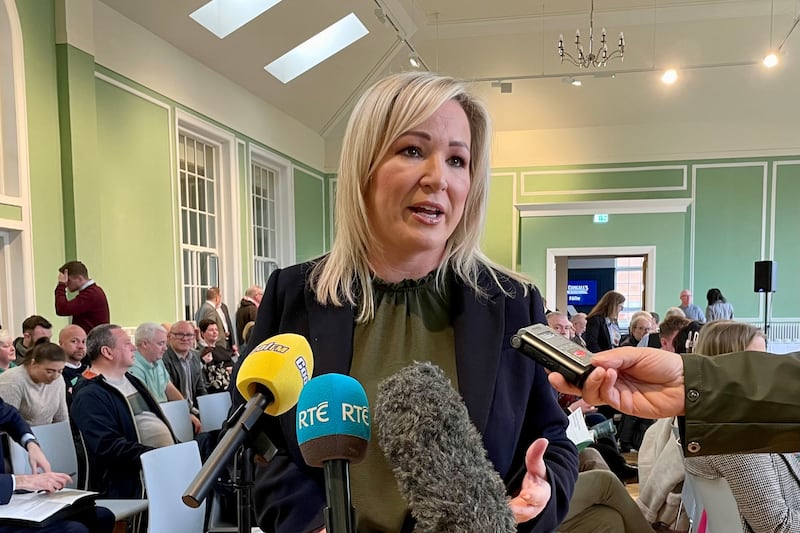Seamus Mallon went to the houses of two life-long friends killed by loyalists and vowed to seal the Good Friday Agreement.
Philip Allen, a Protestant, and Damien Trainor, a Catholic, were shot dead in the Railway Bar in Poyntzpass in Co Armagh on March 3 1998, just weeks before the signing of the landmark peace deal.
Mr Mallon, a future deputy first minister at Stormont, joined then Ulster Unionist leader David Trimble in consoling grieving families who a judge later said suffered one of the most heinous events in the history of Northern Ireland.
The SDLP's former statesman, aged 81, told the Press Association: "It certainly strengthened my resolve about getting an agreement."
He added: "The symbolism of David Trimble and myself together was a stark reminder for ourselves and for everyone else that what we were involved in in the talks was essentially to prevent that ever happening again.
"It had an effect on the decision-making in that it provided a stark reminder of what we had to deal with and it brought a very, very potent urgency to what we were doing."
Mr Trimble went on to become first minister in the powersharing ministerial Executive at Stormont alongside Mr Mallon.
The closing days of the agreement negotiations were "frenetic", Mr Mallon recalled, once having to sleep on a table.
Issues like the release of paramilitary prisoners were largely decided between the British government and Sinn Fein.
He only realised at the very end that the dialogue had convinced the SDLP and UUP to agreement and said respect was essential for political opponents to work together.
Read more:George Mitchell warns about potential impact of Brexit on peace process
The SDLP spent the decades of violence advocating consensual constitutional politics in opposition to the IRA's bloodshed.
Since 1998, it has been eclipsed in the political polls by Sinn Fein while Mr Trimble was ultimately replaced by his arch critic Ian Paisley at the head of the devolved administration.
Mr Mallon recalled: "In my dealings with the Ulster Unionist Party (UUP) and particularly by David Trimble, there was no animosity, we respected each other's position.
"We knew where each of us was vulnerable and we respected that."
Relations were tested by the reform of policing.
Mr Mallon sought radical reappraisal, unionists wanted to protect the honour of the Royal Ulster Constabulary. It was solved by the use of the unbiased outsider Lord Chris Patten to recommend change.
He was the SDLP's former Newry and Armagh MP, an area that suffered greatly during the 30-year conflict, and said an opportunity was missed after the deal.
Mr Mallon said: "It is an absolute shame that so much time and opportunity has been wasted by two parties (the DUP and Sinn Féin) who were not working the very essence of the agreement, which was inclusivity and had the remit to create co-operation and reconciliation.
"Instead, they set up their two political silos, they looked after what they would have regarded as their own and made no advances at all, or no effort in terms of creating a reconciled community in the north of Ireland.
"For them politics was about victory, it was binary, it was them or us, it became a 'them or us' political Executive.
"The main objective of each of those two large political parties was not to work the agreement for the people of Northern Ireland but to work it for their own party political advantages.
"In doing so they have demeaned the agreement which we reached 20 years ago."







